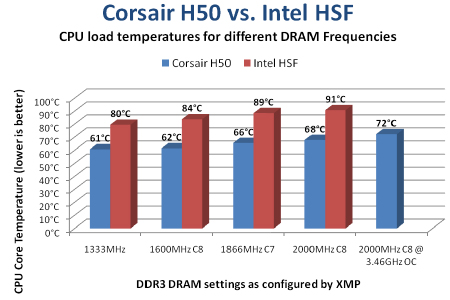We tend not to enjoy marketing spin from most manufacturers, but that's not generally the case with Corsair. The high-end manufacturer of performance PC components tends to back up its marketing with real-world figures obtained via thorough testing.
Hoping to get a little more ammunition, the Fremont, California-based outfit has decided to test whether or not the use of high-end DDR3 memory on an Intel Core i7 platform has an adverse effect on cooling and temperatures. Corsair's results, as expected, have found that high-performance DDR3 requires a Core i7 processor's integrated memory controller to run at higher speeds with increased voltages.
Exactly how much of a knock-on effect does it have? Well, Corsair's figures claim that moving from 1,333MHz DDR3 to 2,000MHz DDR3 on a Core i7 platform can result in an 11°C increase in CPU temperature. Here are the figures for varying memory speeds:

Corsair reckons that Intel's stock cooler is unable to cope with a Core i7 PC sporting DDR3 memory running at 1,866MHz of above. The answer, we're told, is to use a better-performing cooling solution - and Corsair's recommendation is of course its own Hydro H50.
It's an interesting little analysis, and if you want to read up on Corsair's entire test, check out the eight-page PDF at Corsair.com.
Want to know what we think about the Hydro H50 cooler? Check out our in-depth review.













